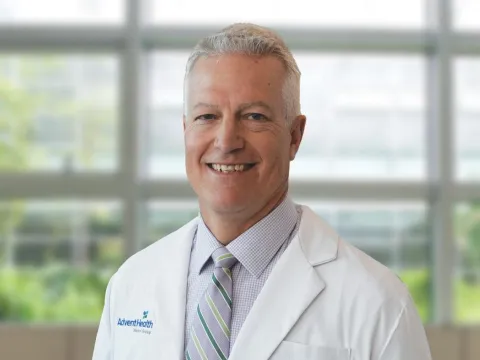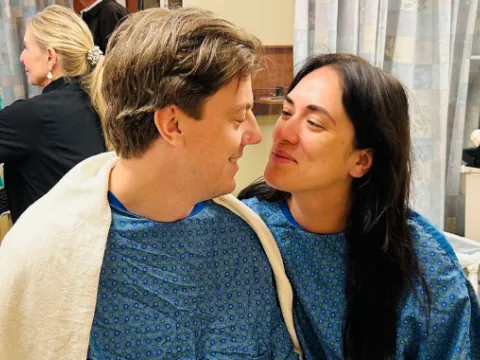- AdventHealth

Every 40 seconds, someone in the United States has a stroke. When time matters most, medical professionals at Shawnee Mission Health (SMH) are using specialized software called RAPID to quickly determine what types of treatment would be best for stroke patients.
May is American Stroke Month. A stroke occurs when a blood vessel (artery) that supplies blood to the brain bursts, or is blocked by a blood clot. The nerve cells in the affected area of the brain are damaged, and may die within four to six minutes. As a result, the part of the body controlled by the damaged section of the brain cannot function properly.
RAPID software uses data from a special CT scan to track blood flow to the brain. In around four minutes, it provides an accurate view of the parts of the brain that have been irreversibly damaged and the parts that may still be saved. The scans are immediately sent to neurologists, who can access the data on their computers and mobile devices to make quick recommendations for the best course of care. Previous methods used to track blood flow to the brain could take close to an hour, were less accurate and were not able to be accessed by doctors outside of the hospital.
The standard of care for eligible patients is a clot-busting drug, but some patients may need clot removal or endovascular therapy to effectively treat their stroke. Both techniques work best the earlier they are used.
"Using RAPID software, we have been able to confidently and rapidly identify patients who would benefit from an attempt at clot extraction," said Gordon Kelley, MD, Medical Director for the Stroke Center of Excellence at SMH. "While this represents a minority of patients, those who are eligible can be quickly transferred to the appropriate care centers to receive treatment. For the more than 90 percent of our stroke patients who are not eligible, they can receive comprehensive care at Shawnee Mission Medical Center, which prevents unnecessary transfers that are uncomfortable and costly for patients."
SMH treats more than 400 strokes and transient ischemic attacks(TIAs) each year. SMH recently received recognition for its commitment to quality stroke care, including The American Heart Association/American Stroke Associations Get With The Guidelines-Stroke Silver Plus achievement award, which recognizes SMH's commitment and success ensuring that stroke patients receive the most appropriate treatment according to nationally recognized, research-based guidelines. SMH also received the Target: Stroke Elite Honor Roll Award.
Although a stroke can happen to anyone, certain risk factors can increase the chances of a stroke. Those risk factors include:
- Hypertension high blood pressure
- Coronary Artery Disease Heart attack, Congestive Heart Failure
- Diabetes
- High cholesterol
Stroke risk factors, continued:
- Hyperlipidemia (elevated HDL lipids, triglycerides)
- Atrial Fibrillation/Atrial Flutter (heart dysfunction)
- Overweight/Obesity
- Tobacco use, smoking
- Drug use
- Alcohol use
- Sedentary lifestyle
- Carotid stenosis
- Migraine Headaches
- Sleep Apnea
- Hormone Replacement Therapy (HRT)
- Renal Insufficiency
- Depression
- Sickle Cell Anemia
- Peripheral Vascular Disease
- Pregnancy
- Prosthetic Heart Valve
- Previous Stroke or TIA
- Stress
The risk for stroke can be reduced by identifying and managing personal risk factors for stroke and understanding how to recognize and respond to signs and symptoms of a stroke. Get more information and resources from the American Stroke Association. If you are interested in seeing if you are at risk for a stroke, take our free, online seven-minute assessment.
Recent News


Final steel beam marks key step in AdventHealth Daytona Beach expansion
Local leaders, officials, and construction workers gathered today to commemorate a major milestone in the expansion underway at AdventHealth Daytona Beach: placing the final steel beam.

Orthopedic surgeon returns to AdventHealth
Dr. Jeffrey Keen, a board-certified orthopedic surgeon specializing in adult reconstruction, orthopedic surgery, robotic-assisted surgery, and sports medicine, has returned to AdventHealth Medical...

Hundreds of transplant patients and their families reunite with AdventHealth Transplant Institute caregivers
In recognition of National Donate Life Month, nearly 300 transplant patients and their families enjoyed AdventHealth’s 2025 transplant reunion.

Ashley and Jimmy celebrate life together after kidney donation
According to the National Kidney Foundation, more than 101,000 people are currently on the organ transplant list in need of a new kidney. However, only about 17,000 transplants happen each year —...

David Banks named president/CEO for AdventHealth
The AdventHealth Board of Directors has appointed David Banks as the organization’s new president/CEO, effective immediately.
